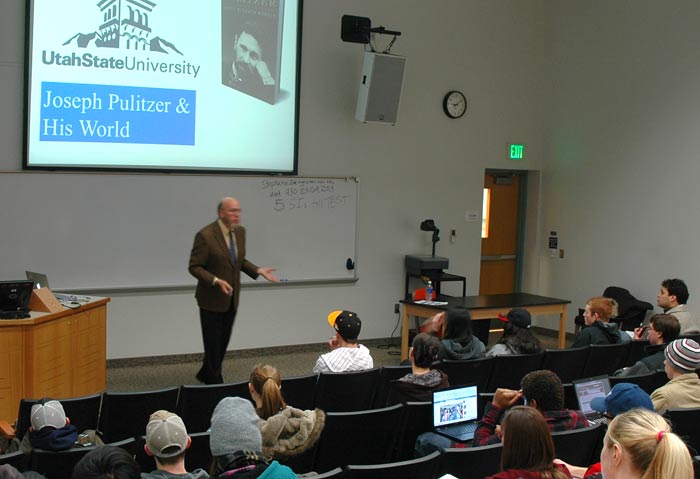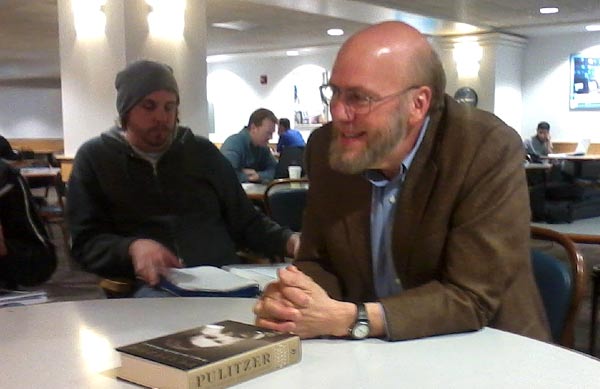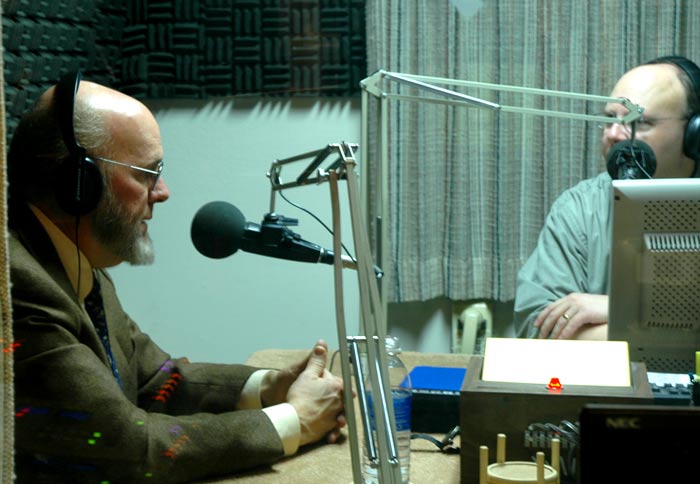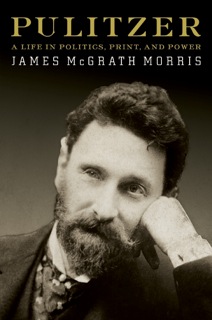Pulitzer changed America and the role of the press, biographer says
January 29th, 2011 Posted in OpinionBy David Bowman
LOGAN—When Joseph Pulitzer arrived in the United States in 1864 as a 17-year-old Hungarian mercenary soldier imported to fight for the North in the American Civil War, it is safe to assume that no one could have had any idea of his enduring impact on his new country.
“Like Alfred Nobel, Joseph Pulitzer is better known today for the prize that bears his name than for his contribution to history,” reads the blurb on the jacket of a new book by biographer James McGrath Morris, who came to Utah State this week to tell the story of one of the best-known press barons in American journalism.
 “Yet, in nineteenth-century industrial America, while Carnegie provided the steel, Rockefeller the oil, Morgan the money, and Vanderbilt the railroads, Pulitzer ushered in the modern mass media.”
“Yet, in nineteenth-century industrial America, while Carnegie provided the steel, Rockefeller the oil, Morgan the money, and Vanderbilt the railroads, Pulitzer ushered in the modern mass media.”
Morris, a veteran journalist, book publisher and author, spoke on “Pulitzer: A Life in Politics, Print, and Power” as part of the Department of Journalism & Communication’s Morris (no relation) Media & Society Lecture Series.
• Listen to hour-long interview on Pulitzer’s impact on American journalism with Morris on Utah Public Radio’s “Access Utah.”
After a tedious year-and-a-half as a Union soldier, the Civil War ended. Unable to find work in New York City, Pulitzer migrated west to St. Louis, where he got a job working for a local German newspaper.
Soon, Pulitzer became involved in St. Louis and Missouri politics and, at the age of 22, he was elected into the Missouri Legislature.
Biographer Morris, who spent more than five years pursuing Pulitzer’s story, says the young Jewish immigrant soon came to see politics and the press as opposite sides of the same coin—tools of political reform, power and social change.
to see politics and the press as opposite sides of the same coin—tools of political reform, power and social change.
Failing in a reelection bid, in 1878, Pulitzer scraped together $2,500 to purchase a defunct newspaper, The St. Louis Evening Dispatch, at auction, entering a newspaper market dominated by purely partisan newspapers—The Misouri Republican and The Missouri Democrat.
Before he purchased the paper, Morris said, it could be said that Pulitzer had been “throwing pebbles into the pond” that would later be known as the modern mass media. After buying the Dispatch, Morris said, it was as if he was throwing boulders into it.
American newspapers in the late 1800s were generally political organs read by the wealthy, Morris said. The lower classes rarely read a newspaper, and never saw their lives reflected there. But Pulitzer, himself a recent immigrant, saw opportunity, focusing his reporters on the lower classes, first in St. Louis and later in New York.
Pulitzer’s brand of journalism delivered fresh local and national news, Morris said, with larger headlines and entertaining articles and cartoons breaking up the traditional grey of the existing press of the day.
Pulitzer’s newspapers told the stories of the poor, and ran advertising that attracted women. These changes drew the lower classes to his newspaper, Morris said, which Pulitzer sold for only a penny.
After an embarrassing event that involved one of Pulitzer’s editors shooting and killing an angry subscriber in the newsroom, Morris said, Pulitzer decided to move back to New York City, which in the 1880s was the “capitol” of the United States—politically, economically and journalistically. In 1883, Pulitzer bought another dying newspaper, The New York World, betting that his “Western” journalism would sell in the big-city New York market.
Pulitzer soon turned the World into one of the biggest newspapers in the city, Morris said, and changed American journalism in the process. He kept up on the current international news, and added color illustrations and comics, recipes, novel excerpts and sheet music—which Morris calls an early version of “streamed” music.
 “Placing items like recipes and sheet music in the newspaper was like downloading the same items off the Internet today,” Morris said. He also said the New York World would be comparable to CNN today.
“Placing items like recipes and sheet music in the newspaper was like downloading the same items off the Internet today,” Morris said. He also said the New York World would be comparable to CNN today.
Pulitzer’s World was printed hourly and delivered to the streets by newsies, illiterate street urchins who would call out the latest headlines to attract buyers with short, easily remembered headlines like, “Tiny Tot Falls to Death as His Mother Watches.”
During Pulitzer’s time in New York, Morris said, he was “accidently” elected to Congress, but after spending only a few hours in his first session, he quit. Morris said Pulitzer was disappointed by how lawmaking was done in Washington, and he returned to where the real power was—at his World.
“Print gives dignity and meaning to words,” Morris said, while explaining that Pulitzer continued to aim his newspaper at the lower classes of New York City’s lower East Side. He said the World connected with these people by writing about their lives and their neighbors and what had happened to them.
This caused a much greater impact on increasing subscribers because lower classes didn’t much care for the high society news.
When France gave the Statue of Liberty to the United States, Pulitzer ran stories asking for pennies to help build a foundation for the statue. His readers would come to the World offices and donate a penny or two at a time, Morris said, and Pulitzer published their names every day. Seeing their names in the newspaper filled his readers with pride, Morris said, and both raised money for the Statue of Liberty and increased the World’s circulation, eventually to more than a million copies a day.
“Pulitzer believed that journalism should be used to light the dark recesses of the government,” Morris said.
Pulitzer was still very politically active and almost got thrown in prison by President Teddy Roosevelt over the World’s stories on the possibility of a scandal related to the Panama Canal.
Near the end of his life, Pulitzer became blind and turned himself into a recluse. Before he died, Pulitzer created the Columbia Graduate School of Journalism and the annual awards for journalism that bear his name.
 Morris said he did this because of his belief in the importance of public-service journalism, and to cleanse his legacy of the “yellow journalism” newspaper battles with William Randolph Hearst.
Morris said he did this because of his belief in the importance of public-service journalism, and to cleanse his legacy of the “yellow journalism” newspaper battles with William Randolph Hearst.
Journalism today still owes much of its character to the kind of journalism Pulitzer helped invent in the late 19th century, says Morris.
“The heart of journalism is storytelling,” he said. “We are storytellers and story-listeners, and that was the magic of The World.”
Pulitzer understood that writing about and for people was the way to build interest and, ultimately, public involvement and social change, Morris said. The key to that engagement is compelling narrative, he said.
“[Today], the media are increasingly becoming a purveyor of [only] information,” Morris said, “but information without knowledge and context is of little use to us.
“The intimate narrative story is what connects” with readers and listeners, he said. “That’s why we read novels: those stories connect us with the experiences of others. The power of journalism to change the world is when we make those intimate connections.”
Whether in Pulitzer’s day or now, Morris said, the lesson endures: “Journalists will succeed if they can deliver the content that the reader wants.”
Upcoming Morris Media & Society events, sponsored by the Department of Journalism & Communication at USU:
• Feb. 7: Nate Carlisle. Salt Lake Tribune reporter comes to campus to meet with journalism students and members of The Utah Statesman staff to discuss investigative reporting techniques, and promote IRE (Investigative Reporters and Editors). AnSci 303, 4-6 p.m.
• Feb. 11: John Dimick. JCOM alumnus and vice president of the radio division of the Lincoln Financial Media Group in Atlanta returns to his alma mater to deliver a College of Humanities & Social Sciences Distinguished Alumni Series talk “You Can Take the Boy Out of the Country…” USU Haight ALumni House, 12:30-1:30 p.m.
• Feb. 17: Mandalit del Barco. “Haiti, Hemp & Hollywood”—The National Public Radio West Coast correspondent comes to Utah to discuss how her reporting on stories like the Haiti earthquake, California’s proposition to legalize marijuana, and upcoming coverage of the Grammy and Oscar Awards can “nudge the world a little.” Eccles Conference Center Auditorium, USU campus, noon-1:30 p.m.
• Feb. 22: Paul Murphy. Utah Atty. Gen. Mark Shurtleff’s public information officer visits the JCOM Department, sponsored by USU’s PRSSA Chapter. Details to come.
• March 17: Nancy Conway. The editor of The Salt Lake Tribune comes to campus to debunk “the myth of the dying newspaper.” Details to come.
• April 12: RonNell Anderson Jones. USU alumna, BYU law professor and former clerk for Supreme Court Associate Justice Sandra Day O’Connor, on legal issues for a free press in a changing media landscape. Details to come.
TP
Tags: James McGrath Morris, journalism, Morris Media & Society Lecture, Pulitzer

2 Trackback(s)
Sorry, comments for this entry are closed at this time.